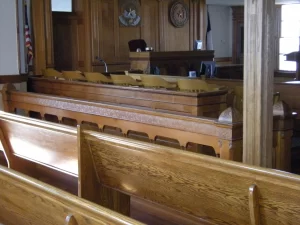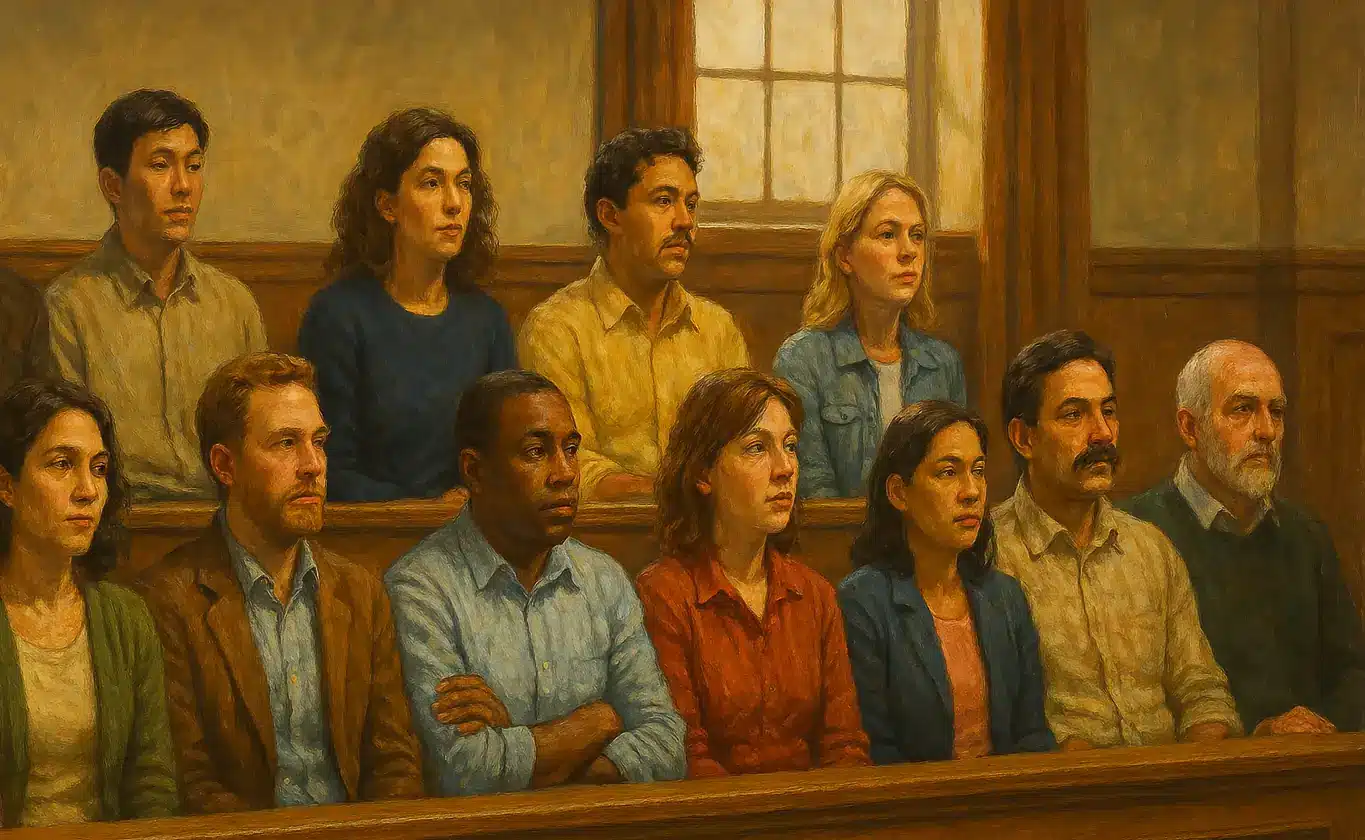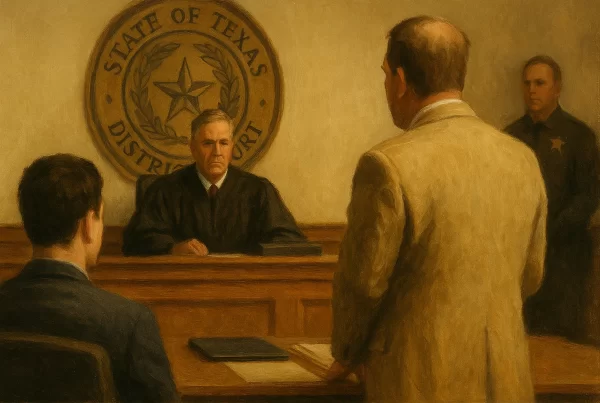Role of Juries
The role of a jury is to determine the guilt or innocence of a criminal defendant, or to adjudicate a civil dispute. In Texas, a jury consists of 6 or 12 jurors, depending on the type of court where the case is being tried. The jurors are Texas citizens convened to render an impartial verdict (a finding of fact on a question) submitted to them by a court.
The jury receives instructions and guidance from a judge, but makes its own decision as to the question submitted to it. The role of each juror is to fairly and impartially listen to the evidence presented and, with the fellow jurors, to review and weigh that evidence to arrive at a verdict. In a criminal trial, the verdict of the jury determines the guilt or innocence of the defendant in the eyes of the law. The jury may also set a penalty or judgment.
There are two types of jury: grand juries and petit juries, also called trial juries. This article discusses only the role and functions of petit juries. Grand juries play a different role and are discussed in a separate article.
Jury Process
- Jury Summons: A potential juror will receive a notice in the mail to appear for jury duty.
This summons provides the date, time, and location of the court appearance. - Jury Selection: At court, attorneys will question the potential juror to ensure fairness and impartiality. This process, called “voir dire,” helps both sides choose jurors who can make unbiased decisions.
- Oath: If selected, the juror will swear to follow the law and remain impartial. The juror’s oath ensures they will base their decision solely on the evidence presented in court.
- Trial: The juror will listen to the evidence, witness testimony, and arguments from both sides. Throughout the trial, the juror should pay close attention to all the details to make an informed decision.
- Deliberation: After the trial, the juror and fellow jurors will discuss the case privately to reach a verdict. Deliberation is where jurors review the evidence together and discuss different viewpoints before deciding.
- Verdict: The juror will help decide whether the defendant is guilty or not guilty, based on the law and the evidence presented. In criminal cases, the verdict must be unanimous, meaning all jurors must agree. In civil cases, the verdict does not need to be unanimous, but a majority of jurors must agree.
- Return to Court: Once a decision is made, the jury will return to court to announce the verdict. The jury foreperson will read the verdict aloud in front of the judge.
- Sentencing: The jury’s role in sentencing depends on the type of case. In capital criminal cases, the jury decides both guilt and the sentence. In non-capital criminal cases, the jury may recommend a sentence, but the judge determines the final one. In civil cases, the jury only decides liability and damages, not sentencing.
- End of Service: After the trial, the juror’s service will be complete. The juror will be officially dismissed, and they may be excused from future jury duty for a set period.
Judge vs Jury Roles
Not all cases are decided by jury trial. While the U.S. and Texas constitutions guarantee the right to a jury trial in criminal cases, a defendant may waive that right in favor of a trial in which a judge decides the outcome, also known as a bench trial.
In civil trials, either the defendant or plaintiff may request a jury trial. However, if neither party makes such a request in writing, the suit will be decided by the judge.
Juries decide family law disputes too, such as divorce cases and child custody matters. A parent is entitled to a jury trial if the state is seeking to terminate a parent’s parental rights.
This article is provided for general informational and educational purposes only and does not constitute legal advice. The laws and procedures discussed herein reflect Texas statutes and legal norms as of the time of writing and may be subject to change. Individuals facing arrest or criminal charges should consult a licensed attorney for guidance specific to their situation. Texapedia is a privately maintained encyclopedia and does not provide legal representation or services.
Jury Selection
In Texas, jurors in each county are selected from a list of all people who are registered to vote, hold a driver’s license, or hold a state identification card.
Under state law, jury duty is a compulsory civic service, though citizens may be excused from the duty under certain circumstances. Jurors are not reimbursed for their service apart from a $6 to $50 daily stipend, and sometimes free meals, public transportation, or child-care.
Potential jurors in a case typically receive a summons by mail, directing them to appear at a courthouse at a particular time.
The judge and lawyers then engage in a process called jury selection, whereby some of the jury pool are selected to serve for the duration of the trial, while others are excused.
Qualifications for Jury Service
To serve on a jury in Texas, a person must meet the following qualifications:
- be at least 18 years of age;
- be a citizen of the United States;
- be a resident of Texas and of the county in which he/she is to serve as a juror;
- not be disqualified from voting for any reason (though actual voter registration isn’t required);
- be of sound mind and good moral character;
- be able to read and write;
- not have served as a juror for six days during the preceding three months in the county court or during the preceding six months in the district court; and
- not convicted or under indictment for misdemeanor theft or a felony.

Juror Oath
After a jury has been selected, the following oath is administered to them in criminal cases: “You and each of you do solemnly swear that in the case of the State of Texas against the defendant, you will a true verdict render according to the law and the evidence, so help you God.”
In civil cases, the oath differs slightly: “You, and each of you, do solemnly swear that in all cases between parties which shall be to you submitted, you will a true verdict render, according to the law, as it may be given you in charge by the court, and to the evidence submitted to you under the rulings of the court. So help you God.”
Juror Instructions
The judge of a court will instruct the jury in the rules of the court. These typically include:
- Jurors must turn off all phones and other electronic devices while in the courtroom. (An emergency number may be provided so that jurors can be reached in emergencies).
- Jurors must not post anything about the proceedings on the internet before being released from jury duty.
- Jurors must not record or photograph any part of the proceedings.
- Jurors should not mingle or talk with the lawyers, witnesses, or parties to a case, though they may exchange casual greetings.
- Jurors should not discuss a case with anyone, even a spouse or a friend.
- Jurors should not investigate the case on their own, including by doing their own legal research, internet research, visiting a crime scene, etc.
A juror who violates these rules could be found guilty of juror misconduct and the court might have to order a new trial.
Frequently Asked Questions
A person who fails to answer a summons for jury duty is subject to a fine of $100 to $1,000. Similarly, somebody who has been picked for jury service but fails to attend court without a reasonable excuse may be fined between $100 and $500.
Yes, the court may grant a hardship excuse, an excuse for a religious holiday, for a person who is the caretaker of another, for a person over 70 years old, for a person attending university, or for a variety of other reasons.
No, an employer is not required to pay a juror for the days while he serves on jury duty. However, the employer cannot fire the employee for serving on a jury.



